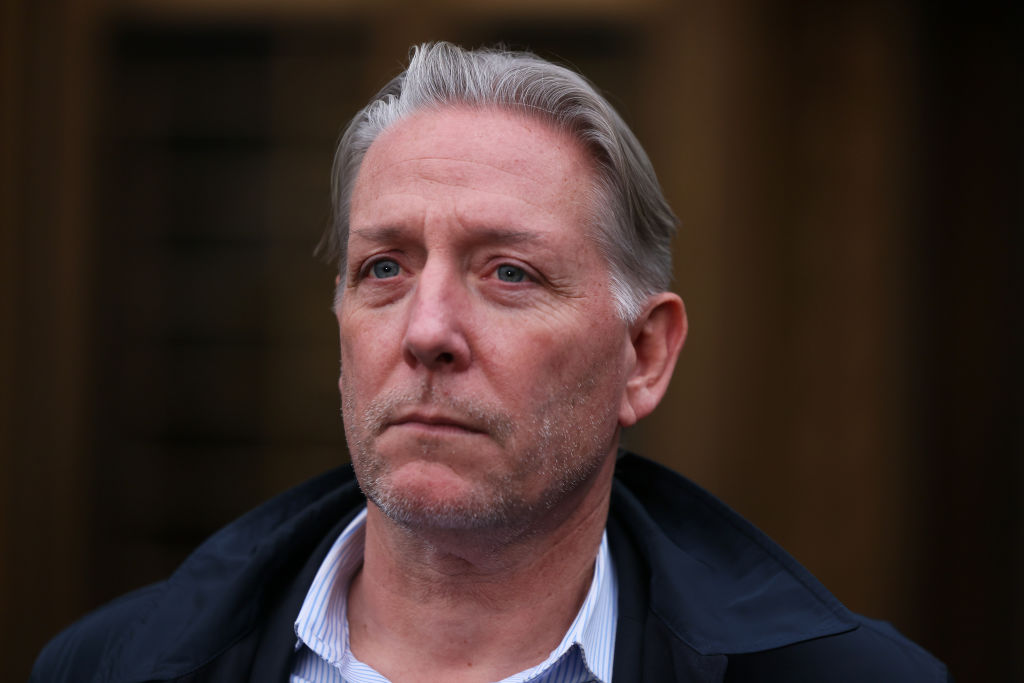Happy Wednesday! At a recent virtual summit, Whole Foods Market reportedly asked its suppliers to consider lowering their prices in order to bring overall costs down for consumers.
Geez, why didn’t anybody think to do that earlier?
Quick Hits: Today’s Top Stories
- The State Department sent a report to Congress Tuesday accusing Russia of violating the New START nuclear arms treaty by refusing site inspections and ignoring U.S. requests to discuss compliance concerns. This is the first time the U.S. has found Russia out of compliance with the agreement—which seeks to limit the number of deployed nuclear warheads and bombs to about 1,550—since it was enacted in 2011. Russia’s deputy foreign minister said this week it’s “very possible” the treaty will not be renewed when it expires in 2026.
- Defense Secretary Lloyd Austin and South Korean Defense Minister Lee Jong-sup issued a statement Tuesday agreeing to scale up their two countries’ joint military exercises, which had been scaled back under the Trump administration as part of negotiations with North Korean leader Kim Jong-un. Austin also reaffirmed the United States’ extended deterrence commitments to South Korea in the face of the North Korean nuclear threat.
- The Justice Department charged four more people yesterday in connection with the 2021 assassination of Haitian President Jovenel Moïse, bringing the total number of defendants in U.S. custody to seven after three men linked to the assassination were arrested last year. Two Haitian-American citizens and a Colombian citizen were charged with conspiring to commit murder, while another Haitian-American citizen was charged with smuggling goods from the United States.
- The Bureau of Labor Statistics reported Tuesday employer spending on wages and benefits—a closely watched indicator of inflation—increased 1 percent last quarter, slowing from the 1.2 percent quarter-over-quarter increase in Q3 2022. The data will be of particular interest to the Federal Reserve, which is likely to announce today it is slowing the pace of interest-rate hikes.
- The European Union’s statistics agency reported Tuesday the Eurozone’s gross domestic product (GDP) grew 3.5 percent in 2022, outpacing both China and the United States for the first time since 1974. Economists expect the Eurozone’s growth to cool in 2023, however, as high energy prices and rising interest rates put a damper on economic activity.
- Citing two sources familiar with the investigation, CBS News reported Tuesday FBI agents searched President Joe Biden’s offices at the Penn Biden Center in November, a step neither the White House nor Biden’s personal attorneys had disclosed during the president’s ongoing classified document saga. The search was allegedly conducted in cooperation with Biden’s lawyers, and came days after those lawyers found the first set of documents at the center. It’s not clear whether the FBI’s search produced additional material with classification markings.
- A new study from the Stanford Institute for Economic Policy Research—conducted in conjunction with the Treasury Department—found black taxpayers are at least three times more likely than other Americans to be the target of IRS audits. The study does not allege any overt discrimination by IRS agents, but rather a computer algorithm favoring audits that will be simpler to conduct. As a result, black Americans—less likely to report business income, and more likely to file returns with potential errors that are easy to identify—have reportedly faced a disproportionate amount of scrutiny. “Historic challenges and underfunding have led to audit rates for those at the top of the distribution decreasing more than the correspondence audits of those at the bottom in the last decade, which should change,” Deputy Treasury Secretary Wally Adeyemo wrote last fall.
- After a private sit-down with GOP House Speaker Kevin McCarthy, Republican Rep. George Santos of New York told House colleagues on Tuesday he will temporarily step down from his committee assignments on the House Small Business and Science, Space, and Technology committees. In a statement Tuesday, the embattled congressman thanked the speaker for “allowing me to take time to properly clear my name.” Santos, who fabricated much of his resume and has been asked to resign by members of his own party, vacates his committees as McCarthy is expected to hold a vote to strip Minnesota Democratic Rep. Ilhan Omar of her committee assignment over past comments she’s made about Israel that members of both parties called antisemitic.
- Mitch Daniels, the former Republican governor of Indiana and president of Purdue University, told Politico on Tuesday that, after much consideration, he will not run for the U.S. Senate seat being vacated by GOP Sen. Mike Braun, who announced in November he plans to run for governor in the state. Republican Rep. Jim Banks has already announced his candidacy for the open seat.
Spycatcher, Caught

In 2020, former FBI official Charles McGonigal spoke on an Atlantic Council panel about corruption in Russia’s security services. “You are seeing an erosion in any rule of law,” he said. “It would be akin to having in the United States the FBI as a rogue element, operating at the behest of the highest bidder.”
Russia’s security forces are indeed impressively corrupt, but in hindsight it’s possible McGonigal was also projecting just a bit: The Department of Justice alleges that shortly before and after leaving the FBI, McGonigal took money from foreign nationals—including a sanctioned Russian oligarch—in exchange for services and favors. If the allegations are proven, his seniority and authority over sensitive investigations make this a major black eye for the Bureau and U.S. law enforcement—but also evidence of the agencies’ commitment to prosecuting even senior officials’ misdeeds despite risking a reputational hit.
A 2016 FBI press release announcing a promotion for McGonigal rattles off his accomplishments: He investigated 9/11, Russian organized crime and counterintelligence, and the bombings of the U.S. Embassies in Tanzania and Kenya. He led the WikiLeaks probe of Chelsea Manning and reportedly searched for moles blowing CIA spies’ cover in China. When reports surfaced in 2016 that Russians had hacked the Democratic National Committee’s emails, McGonigal was head of the FBI’s cyber crimes division in Washington, D.C. Before leaving the agency in September 2018, he was promoted to special agent in charge (SAC) of the counterintelligence division of the FBI’s New York field office, making him a senior spycatcher in a city that draws dignitaries and moguls from all over the world.
McGonigal also supervised investigations into Russian oligarchs—including Oleg Deripaska. The FBI tried to recruit the aluminum and energy magnate as an informant in 2014, but the U.S. sanctioned him four years later for his alleged Kremlin ties and in 2022 accused him of plotting to evade those sanctions. Deripaska was also a client of one-time Trump campaign manager Paul Manafort, who owed him millions.
Deripaska features heavily in the allegations against McGonigal. An indictment unsealed last week in the Southern District of New York alleges McGonigal connected with Deripaska associates in 2018 and met with Deripaska after leaving the FBI while the oligarch searched for a law firm to help get him off the sanctions list. Subsequently, McGonigal allegedly accepted a $25,000 gig as an investigator for the chosen firm. In 2021, according to the indictment, McGonigal worked directly for Deripaska investigating a rival oligarch. The DOJ has charged McGonigal and Sergey Shestakov—a former Soviet and Russia diplomat turned U.S. citizen who the DOJ says was involved in McGonigal’s alleged misconduct—with violating sanctions, laundering money, and using shell companies and forged signatures to hide Deripaska’s payments.
“McGonigal betrayed his solemn oath to the United States in exchange for personal gain and at the expense of our national security,” said FBI Assistant Director in Charge Donald Alway, whose Los Angeles office led the investigation to avoid conflicts of interest in the New York office. “McGonigal is alleged to have committed the very violations he swore to investigate while he purported to lead a workforce of FBI employees who spend their careers protecting secrets and holding foreign adversaries accountable.”
That’d be more than enough to put McGonigal away for a long time, but his alleged misdeeds don’t end there. According to another indictment unsealed in Washington, D.C., starting in August 2017 McGonigal hid from the FBI his relationship with an Albanian former intelligence official. He allegedly met with foreign nationals including the Albanian prime minister—helping arrange meetings with U.S. officials, giving advice on oil contracts—and allegedly received $225,000 from the arrangements while still at the Bureau. One payment of $80,000 was allegedly handed over while McGonigal sat in his car outside a New York City restaurant, and a woman who had an affair with McGonigal told Insider he once stored a bag of cash in his Brooklyn apartment and often spent money freely. Meanwhile, McGonigal reportedly used the Albanian former intelligence official as a source for a criminal investigation into foreign lobbying but didn’t disclose their relationship to the FBI as he was mandated to do.
“That would be an egregious violation of his responsibilities to the FBI,” said Rod Rosenstein, who as deputy attorney general during the Trump administration appointed Robert Mueller to examine alleged ties between Russia and the Trump campaign. “Both taking the money, which is illegal in itself, and then failing to report it on annual financial disclosure forms, which are intended to reveal any potential conflicts that the employee has. He would have been well aware of his obligation to report it to his supervisors.”
In case our repeated use of the word “alleged” wasn’t a hint, these accusations haven’t been proven in court. McGonigal pleaded not guilty to the charges, and his defense could meaningfully undermine the DOJ’s presentation of the situation. “Charlie served the U.S. effectively for decades,” his attorney, Seth DuCharme, said before the plea. “We look forward to seeing the evidence.”
Still, the indictments are an awfully bad look, casting a shadow well beyond the immediate allegations. The FBI has shown it’s willing to pursue and investigate offenses in its own ranks, but that may not reassure allies wondering if other top officials are corruptible—or dissuade adversaries from trying to recruit other U.S. officials.
Meanwhile, national security officials will need to sift through McGonigal’s past work. “A counterintelligence damage assessment must now determine whether McGonigal’s potential compromise even unintentionally affected Special Counsel Robert Mueller’s investigation into Russian interference in the 2016 presidential election, or aided Moscow’s assassination operations against Russian defectors in the West,” Kevin Carroll—former Homeland Security senior counsel and CIA and Army officer—wrote in The Dispatch last week. “The national security implications are severe, even if McGonigal just unwittingly and indirectly gave information.”
Worth Your Time
- On Tuesday, workers in the Boeing factory in Everett, Washington turned over the last new 747, an era-defining plane that has been in production for more than 50 years. “With a distinctive hump, the 747, nicknamed the ‘Queen of the Skies,’ is perhaps the most widely recognizable commercial airplane ever built,” Niraj Chokshi writes for the New York Times. “For many of the people who worked on the airplane, the delivery of the final 747 is a bittersweet moment. ‘You have an airplane that’s kind of done its duty for 50 years,’ said Scott Pettersen, who spent nearly four decades as a mechanic on the 747 before retiring in 2016. Mr. Petterson estimated that he helped to build more than 1,200 747s. But despite all that time with the airplane, Mr. Petterson said he had never traveled on one. ‘I would like to fly in a 747,’ he said. ‘I’m sure it’s a great feeling.’”
- The Cleveland Guardians lost the heartbeat of their stadium this week. John Adams, who sat atop the bleachers with a massive drum for nearly 4,000 games over the course of 50 years, passed away this week at the age of 71. “That drum accompanied every critical moment of Cleveland baseball for the past half-century,” Zack Meisel writes in The Athletic. “Listen closely as an opposing pitcher scans his catcher’s signs in the ninth inning of a close game. You’ll hear it, a steady hum that builds to the moment the hurler comes set. Listen closely as a Cleveland hitter produces a key hit. You’ll hear it, a rapid rattle that reflects the energy of the moment. In 2020, he watched the games from his home office, with his drum by his side. That was a painful summer for Adams. Watching games from home was foreign to him. Watching games without Adams in the stands was—and will be—foreign for everyone.”
- Here’s something you won’t see every day: a lengthy essay ruminating on Charles Schulz’s filthiest character. “There is something hard to pin down in Pig-Pen’s condition,” Elif Batuman writes in Astra Magazine. “The nature, even the physical behavior of Pig-Pen’s dirt fluctuates. From one week to another, it is likened to chalk powder (as when he ‘washes’ his hands by beating them together, ‘the way they clean erasers’), to sand (you could put ‘four boards around that kid and have an ‘instant sandbox’’), to soil, mud, and dust. He is described as being ‘cooled by several layers of clay’ (protecting him from heat), or blending in with the dirt at second base. He is associated with bacteria, carrying his Easter jelly beans around so long that they start to ‘ferment.’ Violet describes him as a ‘germ carrier.’ Pig-Pen seems offended, but declares that even germs need a rest. The physical dirt itself: Is it organic or inorganic? Does it come off? Does Pig-Pen want it to?”
Presented Without Comment
Also Presented Without Comment
Also Also Presented Without Comment
Toeing the Company Line
- On last night’s edition of Dispatch Live (🔒), Steve was joined by the Dispatch Politics team—Andrew, David, and Audrey—to discuss the launch of their new newsletter and 2024. What does Mitch Daniels’ decision to bow out of the U.S. Senate race in Indiana mean for the GOP? Are Republicans engaging in the same magical thinking that led to a Donald Trump nomination in 2016? Does the former president have a competent campaign team this time around? Members who missed the conversation can catch a rerun—either video or audio-only—by clicking here.
- Jonah is joined by Nancy Rommelmann on today’s episode of The Remnant for a conversation about Portland. How did the city descend into something resembling Escape from New York? Can its problems be fixed anytime soon?
- Haley’s latest Uphill unpacks lawmakers’ plans to punish China should it invade Taiwan during this Congress. “Whether U.S. allies would quickly rally against China after a move against Taiwan, as they did with Russia, is unclear,” she writes. “China’s ‘price of military action against Taiwan needs to be higher than the benefit’ in order to deter an invasion, Sen. Marco Rubio said.”
- In this week’s edition of The Sweep (🔒), Sarah talks “Teflon Ron” DeSantis and zeroes in on the Democratic presidential field, should President Biden decide not to run. “Ask rank-and-file Democrats whether they want Joe Biden as their 2024 nominee, and the answer is pretty clearly no,” she writes. “Until you ask them who else they think can take his place.”
- Tuesday’s Boiling Frogs (🔒) presents some modest hopefulness on the debt ceiling. “If people whose judgment I trust won’t reassure me, I’ll have to do it myself,” Nick writes. “Is there a case for moderate—emphasis: moderate—optimism that the debt ceiling will be raised before America’s creditworthiness turns to ash? Maybe.”
- On the site today, Paul Matzko argues against Biden’s tech regulation proposals, Charlotte writes on Ukraine’s requests for F-16 fighter jets, and Jonah explains why Ukrainian victory should be a national priority.
Let Us Know
Regarding the McGonigal story, are you more heartened to see the Justice Department is willing to bring difficult cases that hurt the agency’s image, or distressed that such cases are necessary in the first place?







Please note that we at The Dispatch hold ourselves, our work, and our commenters to a higher standard than other places on the internet. We welcome comments that foster genuine debate or discussion—including comments critical of us or our work—but responses that include ad hominem attacks on fellow Dispatch members or are intended to stoke fear and anger may be moderated.
You are currently using a limited time guest pass and do not have access to commenting. Consider subscribing to join the conversation.
With your membership, you only have the ability to comment on The Morning Dispatch articles. Consider upgrading to join the conversation everywhere.